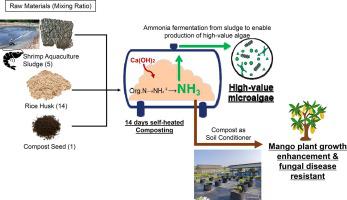当前位置:
X-MOL 学术
›
Waste Manag.
›
论文详情
Our official English website, www.x-mol.net, welcomes your feedback! (Note: you will need to create a separate account there.)
Integrated nutrient recycling: Ammonia recovery from thermophilic composting of shrimp aquaculture sludge via self-heated bench-scale reactor and mango plant growth enhancement by the compost
Waste Management ( IF 8.1 ) Pub Date : 2024-03-23 , DOI: 10.1016/j.wasman.2024.03.021 Hieng Ong Tie , Hasfalina Che Man , Mitsuhiko Koyama , Fadhil Syukri , Fatimah Md. Yusoff , Tatsuki Toda , Kiyohiko Nakasaki , Norulhuda Mohamed Ramli
Waste Management ( IF 8.1 ) Pub Date : 2024-03-23 , DOI: 10.1016/j.wasman.2024.03.021 Hieng Ong Tie , Hasfalina Che Man , Mitsuhiko Koyama , Fadhil Syukri , Fatimah Md. Yusoff , Tatsuki Toda , Kiyohiko Nakasaki , Norulhuda Mohamed Ramli

|
Due to the rapid growth of the aquaculture industry, large amounts of organic waste are released into nature and polluted the environment. Traditional organic waste treatment such as composting is a time-consuming process that retains the ammonia (NH) in the compost, and the compost produced has little economic value as organic fertilizer. Illegal direct discharge into the environment is therefore widespread. This study investigates the recovery of NH through thermophilic composting of shrimp aquaculture sludge (SAS) and its application as a soil conditioner for the growth of mango plants. A maximum composting temperature of 57.10 °C was achieved through self-heating in a 200 L bench-scale reactor, resulting in NH recovery of 224.04 mol/ton-ds after 14 days. The addition of calcium hydroxide and increased aeration have been shown to increase NH volatilization. The recovered NH up to 3 kg-N can be used as a source of clean nitrogen for high-value microalgae cultivation, with a theoretical yield of up to 34.85 kg-algae of microalgae biomass from 1 ton-ds of SAS composting. Despite the high salinity, SAS compost improved mango plant growth and disease resistance. These results highlight the potential of SAS compost as a sustainable source of clean nitrogen for microalgae cultivation and soil conditioner, contributing to a waste-free circular economy through nutrient recycling and sustainable agriculture.
中文翻译:

综合养分回收:通过自加热台式反应器从对虾养殖污泥的高温堆肥中回收氨,并通过堆肥促进芒果植物生长
由于水产养殖业的快速发展,大量的有机废物被排放到大自然中,污染了环境。传统的有机废物处理如堆肥是一个耗时的过程,会保留堆肥中的氨(NH),并且产生的堆肥作为有机肥料的经济价值很小。因此,非法直接排放到环境中的情况非常普遍。本研究探讨了通过对虾养殖污泥 (SAS) 进行高温堆肥来回收 NH,及其作为芒果植物生长土壤改良剂的应用。通过在 200 L 小型反应器中的自加热,最高堆肥温度达到 57.10 °C,14 天后 NH 回收率达到 224.04 mol/ton-ds。添加氢氧化钙和增加曝气已被证明会增加 NH 的挥发。回收的 NH 高达 3 kg-N,可作为高价值微藻培养的清洁氮源,1 吨 SAS 堆肥的理论产量高达 34.85 kg-藻量的微藻生物量。尽管盐度很高,SAS 堆肥仍改善了芒果植株的生长和抗病能力。这些结果凸显了 SAS 堆肥作为微藻培养和土壤改良剂的可持续清洁氮源的潜力,通过养分回收和可持续农业促进无废物循环经济。
更新日期:2024-03-23
中文翻译:

综合养分回收:通过自加热台式反应器从对虾养殖污泥的高温堆肥中回收氨,并通过堆肥促进芒果植物生长
由于水产养殖业的快速发展,大量的有机废物被排放到大自然中,污染了环境。传统的有机废物处理如堆肥是一个耗时的过程,会保留堆肥中的氨(NH),并且产生的堆肥作为有机肥料的经济价值很小。因此,非法直接排放到环境中的情况非常普遍。本研究探讨了通过对虾养殖污泥 (SAS) 进行高温堆肥来回收 NH,及其作为芒果植物生长土壤改良剂的应用。通过在 200 L 小型反应器中的自加热,最高堆肥温度达到 57.10 °C,14 天后 NH 回收率达到 224.04 mol/ton-ds。添加氢氧化钙和增加曝气已被证明会增加 NH 的挥发。回收的 NH 高达 3 kg-N,可作为高价值微藻培养的清洁氮源,1 吨 SAS 堆肥的理论产量高达 34.85 kg-藻量的微藻生物量。尽管盐度很高,SAS 堆肥仍改善了芒果植株的生长和抗病能力。这些结果凸显了 SAS 堆肥作为微藻培养和土壤改良剂的可持续清洁氮源的潜力,通过养分回收和可持续农业促进无废物循环经济。



























 京公网安备 11010802027423号
京公网安备 11010802027423号